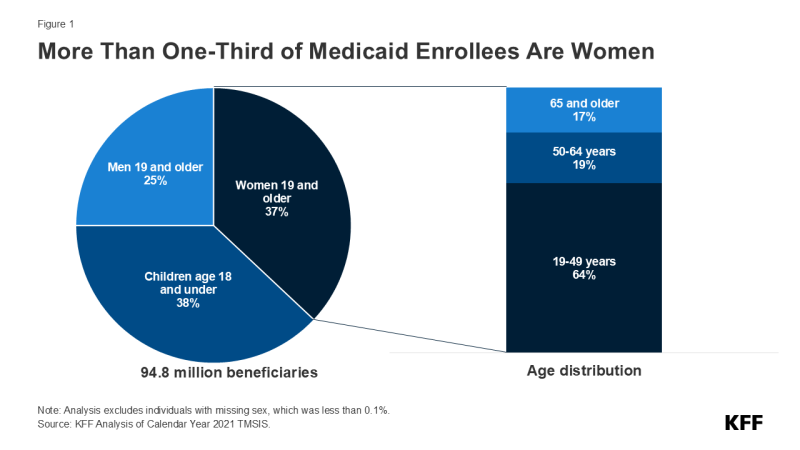Top 5 Things to Know about Women and Medicaid Ahead of the Election
Robin Rudowitz, Usha Ranji, and Brittni Frederiksen
Published:
While the implications of the election on the future of abortion access have received extensive attention, the stakes are also high for the future directions of Medicaid, a program that seven in ten women have a connection to. Vice President Harris and former President Trump hold vastly different views on abortion and Medicaid, key issues affecting women’s health, particularly for women in their reproductive years and with lower incomes. With regard to Medicaid, the Biden-Harris Administration policy proposals have generally focused on efforts to “protect and strengthen Medicaid and the Affordable Care Act (ACA)”, as well as repealing the Hyde Amendment, which limits federal spending on abortion; in contrast, Former President Trump supported plans to repeal or weaken the ACA, cap and reduce Medicaid financing, and restrict Medicaid eligibility while he was president. In a recent column, KFF President and CEO Drew Altman pointed out that Medicaid is the program most likely to be in the crosshairs if Republicans take control this November is Medicaid.
Changes related to Medicaid could have major consequences for health coverage of women with low incomes as well as pregnancy, postpartum and other reproductive health care for women. Here are the top five things to know about women and Medicaid ahead of the election.
- Medicaid is a major source of coverage for women with low incomes (and their children). Medicaid provides coverage to one in five non-elderly adult women, the largest source of coverage after employer coverage (Figure 1). Medicaid covers 43 percent of non-elderly women with low incomes (income below 200% FPL) and over half (52%) of poor women (income below 100% FPL). Medicaid also covers four in ten children and eight in ten poor children.
.
- Medicaid provides coverage to women across the lifespan, including women who are older and those with chronic disabilities. Medicaid provides coverage to women with low incomes who qualify because they meet one of the eligibility categories (pregnancy, parent, disability, or age 65+), or have income less than 138% of poverty through the ACA expansion pathway. Nearly two-thirds (64%) of adult women who are covered by Medicaid are of child-bearing age. Medicaid also covers over four in ten (44%) nonelderly women with a broad range of physical and mental disabilities, including physical impairments and severe mental illnesses. Medicaid finances over half (54%) of all long-term care spending, which is critical for many frail elderly women and women who qualify on the basis of disability. In 2021, 20% of women with Medicare were also enrolled in Medicaid. For these women, Medicaid helps to pay Medicare premiums, deductibles and cost-sharing as well as pay for services not typically covered by Medicare such as long-term care.
.

- Medicaid is a key source of coverage for pregnant and postpartum women and births as well as access to family planning and preventive services. Medicaid covers over 4 in 10 births nationally and the majority of births in many states. Medicaid has also been used as a lever to help address disparities in access and outcomes in maternal and infant health. KFF research has found that the ACA’s Medicaid expansion promotes continuity of coverage in both the prenatal and postpartum periods. Furthermore, as a result of a provision in the American Rescue Plan Act of 2021, nearly all states now allow pregnancy-related coverage to continue through one year postpartum. Over half of the states have established programs that use Medicaid funds to cover the costs of family planning services for low-income women who remain uninsured and Medicaid accounts for 75% of all publicly funded family planning. Most states have limited scope Medicaid programs to pay for breast and cervical cancer treatment for certain low-income uninsured women.
.
- Medicaid provides very limited access to abortion services. The federal Hyde Amendment prohibits federal spending on abortions, except when the pregnancy is a result of rape or incest, or when it jeopardizes the life of the pregnant person. However, states may use their own unmatched funds to pay for abortions for Medicaid enrollees in other circumstances and 19 states currently do so.
.
- Medicaid has broad support and the majority of enrollees prefer to keep it as it is today. The public’s views of Medicaid are also largely positive. KFF public opinion polling shows Medicaid has broad support across political parties, with majorities of Democrats, independents, and Republicans expressing a favorable view of the program. In addition, the majority of the public and Medicaid enrollees prefer to keep Medicaid as it is today, with the federal government guaranteeing coverage for low-income people, setting standards for who states cover and what benefits people get, and matching state Medicaid spending as the number of people on the program goes up or down. Seven in ten women have a personal connection to Medicaid (including health insurance, pregnancy-related care, home health care, or nursing home care, coverage for a child, or to help pay for Medicare premiums for themselves, a family member or close friend). Eight in ten adult women (79%) have a favorable opinion of the program (Figure 5).
. -
